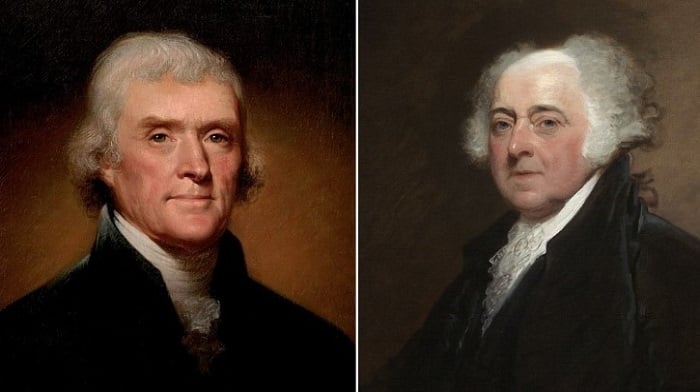John Adams and Thomas Jefferson, the nation’s second and third Presidents respectively, both passed away on the 4th of July within hours of each other in 1826.
The two political adversaries became great friends in their later years and ended up dying exactly 50 years after the Declaration of Independence was adopted.
Adams, George Washington’s successor, lived to the age of 90 while Jefferson was 83 at the time of his death.
Jefferson actually passed away shortly after noon. Hours later, Adams, unaware of the news, uttered his last words: “Thomas Jefferson survives.”
Feuding founders Thomas Jefferson and John Adams both died hours apart on July 4, 1826 — the 50th anniversary of the Declaration of Independence https://t.co/PNnrEmMle3 pic.twitter.com/HYODqe23RV
— CNN (@CNN) July 5, 2018
RELATED: Study: Many Former Presidents Have Had Mental Illness, None Were Removed
4th of July Coincidence – John Adams and Thomas Jefferson Both Die
John Adams and Thomas Jefferson became politically estranged for eleven years after the presidential election (what some call the Second American Revolution) of 1800. Jefferson defeated Adams that year after what is described as a bitter campaign.
Adams had narrowly defeated Jefferson in the 1796 election.
The election brought forth the current two-party dominance in presidential elections and is often cited as the first example of a ‘modern’ election, replete with regional divisions and smear campaigns created by both parties.
Adams would eventually pen a letter to Jefferson on January 1st, 1812, and the two would correspond with each other right up until their coincidentally-dated deaths.
On July 4th, 1986, then-President Ronald Reagan honored their relationship in his own Independence Day address to the nation.
After a bitter and divisive campaign, Jefferson defeated Adams for the Presidency in 1800. And the night before Jefferson’s inauguration, Adams slipped away to Boston, disappointed, brokenhearted, and bitter.
For years their estrangement lasted. But then when both had retired, Jefferson at 68 to Monticello and Adams at 76 to Quincy, they began through their letters to speak again to each other. Letters that discussed almost every conceivable subject: gardening, horseback riding, even sneezing as a cure for hiccups; but other subjects as well: the loss of loved ones, the mystery of grief and sorrow, the importance of religion, and of course the last thoughts, the final hopes of two old men, two great patriarchs, for the country that they had helped to found and loved so deeply. “It carries me back,” Jefferson wrote about correspondence with his cosigner of the Declaration of Independence, “to the times when, beset with difficulties and dangers, we were fellow laborers in the same cause, struggling for what is most valuable to man, his right to self-government. Laboring always at the same oar, with some wave ever ahead threatening to overwhelm us and yet passing harmless . . . we rowed through the storm with heart and hand . . . .”
It was their last gift to us, this lesson in brotherhood, in tolerance for each other, this insight into America’s strength as a nation. And when both died on the same day within hours of each other, that date was July 4th, 50 years exactly after that first gift to us, the Declaration of Independence.
RELATED: Watch Ronald Reagan’s Famous 1986 Independence Day Speech
John Adams Thought Independence Day Should Be July 2nd
John Adams actually thought July 2nd, 1776 marked the most significant day for America’s independence – the day the Continental Congress formally declared its freedom from Great Britain.
“The second day of July, 1776, will be the most memorable epoch in the history of America. I am apt to believe that it will be celebrated by succeeding generations as the great anniversary festival,” he wrote to his wife Abigail.
“It ought to be commemorated as the day of deliverance, by solemn acts of devotion to God Almighty,” said Adams.
“It ought to be solemnized with pomp and parade, with shows, games, sports, guns, bells, bonfires, and illuminations, from one end of this continent to the other, from this time forward forever more.”
Did you know? John Adams believed that July 2nd was the correct date on which to celebrate the birth of American independence, and would turn down invitations to appear at July 4th events in protest. Adams and Thomas Jefferson both died on July 4, 1826—the 50th anniversary.
— Kambree (@KamVTV) July 4, 2021
On July 4th, 1831, five years after Adams and Jefferson passed away, the fifth President of the United States, James Monroe, also died.
Making him the third Founding Father to pass on that historical date.
Now is the time to support and share the sources you trust.
The Political Insider ranks #3 on Feedspot’s “100 Best Political Blogs and Websites.”


